By Liz Stinson
The demands of modern motherhood are inherently comical. Its job description is the perfect setup for a punchline: Person, expecting one thing, gets another.
Motherhood operates on a constantly swinging pendulum. It’s fulfilling and depleting. Beautiful and disgusting. Lonely and suffocating. Like anything, it can feel good or bad depending on the context—or simply how much sleep you’ve gotten. Those dualities make it ripe territory for cartooning.
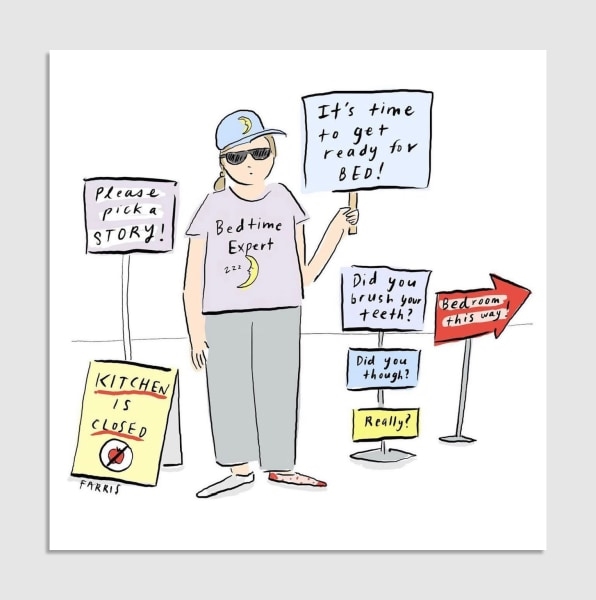
In recent years, a confluence of factors has led to a rise in cartoons that deal with the complexities of motherhood. Instagram has proved a democratizing platform for female cartoonists, who have historically been left out of more traditional forums of publishing. And, as some of those artists have become mothers, they’ve used the medium to carve out a genre that is best described (but also diminished) by the title of “mom cartoons.”
The most well-known members of this club have accumulated hundreds of thousands of followers on Instagram, where they commiserate with strangers about the absurdities of modern parenthood. There are sub-genres within this sub-genre: the frenzied, overworked mom; the self-deprecating mom; the passive-aggressive mom; the mom who is obsessed with her children. None of these niche identities tell the full story of what it means to be a mother, but taken as an amalgam, they come close.
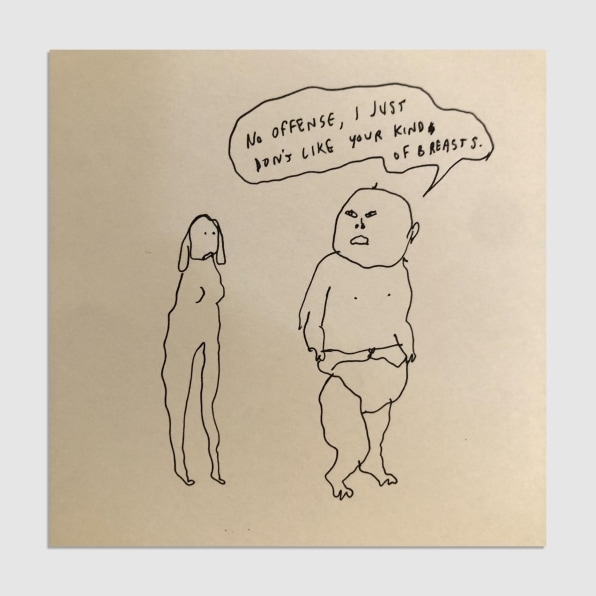
“I love having my feelings summed up and validated for me,” says cartoonist Liana Finck, who contributes to The New Yorker and is working on a graphic novel about motherhood, out next year. Finck rose to cartooning fame with her scribbled-line drawings that deliver stinging observations about life and relationships. When she gave birth to her son a year-and-a-half ago, the subject matter of her cartoons largely shifted to the strangeness of being a new mother.
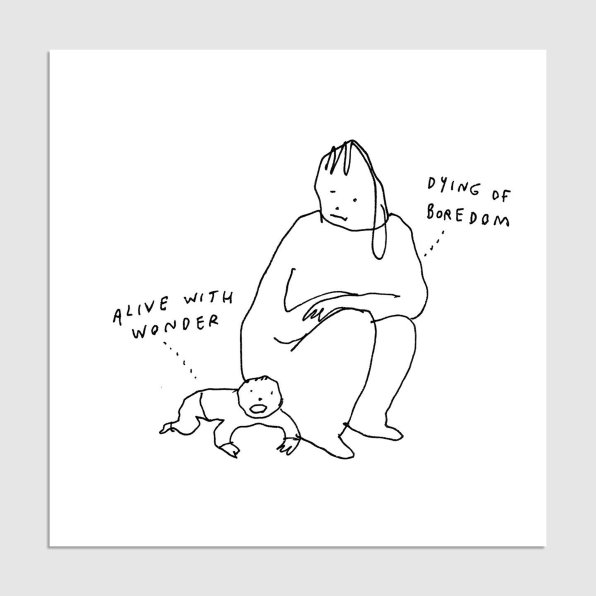
During her child’s first year of life, Finck untangled her feelings about motherhood on her Instagram page. One early-postpartum cartoon featured a giant baby towering over its mother, a scowl on its face. “No offense, I just don’t like your kind of boobs,” the baby lobbed at his defeated parent. In another, a baby crawls on the floor alongside its mom, who is stooped over in a state of exhaustion. “Alive with wonder,” Finck scrawled above the baby; “Dying of boredom” reads a line next to the mother. The post received nearly 22,000 likes.
These cartoons strike a nerve for parents who feel as if they must silently accept the challenges of raising children in a world that feels increasingly at odds with their ability to do so well. If you can’t talk about your problems, at least you can laugh about them . . . in the dark, while you’re scrolling on your phone before the baby wakes up again. “I’ve always felt like cartoons have been good for me because they are a quiet way to say what you’re feeling when you’re not really supposed to say it,” Finck says.
Motherhood cartoons are often explicit in their exploration of interior states, but cartooning and comics have always been a medium that celebrates the vulnerability of its characters, both in text and symbol. Even in comics as culturally pervasive as Marvel or DC’s superhero stories, there’s an element of human fallibility that makes the characters resonate with the average person. Being able to shoot spiderwebs through your hands is cool, but Spiderman would be a lot less compelling if he weren’t just an awkward teen underneath it all.
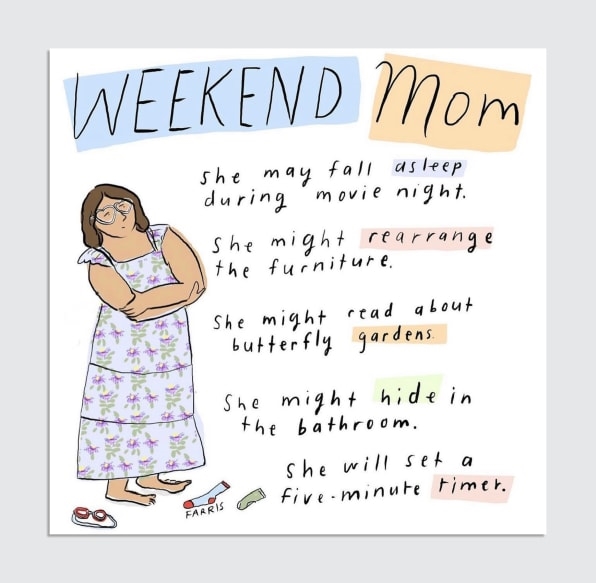
Cartoons are exceptionally good at cloaking uncomfortable truths and emotions in a shroud of humor, and doing so without asking too much of the reader. “You can juxtapose interiority in a really interesting way with cartoons—what you’re saying versus what you’re thinking,” says Grace Farris, a cartoonist whose recurring cartoon, “Working Mom,” wryly pokes fun at the low-key weekend pleasures of depleted parents.
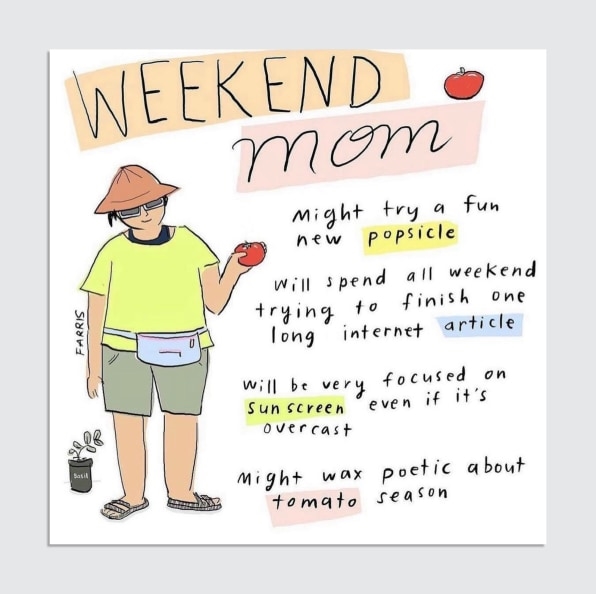
Farris, who is a doctor by day and cartoonist by night, started making comics as a way to sort through some of the harder moments in early motherhood. She found that writing and drawing about her anxieties had a way of making them feel less stressful—a phenomenon that has been scientifically validated. When she started posting to her Instagram account, she realized that whatever issue she was experiencing, other mothers had probably dealt with it too.
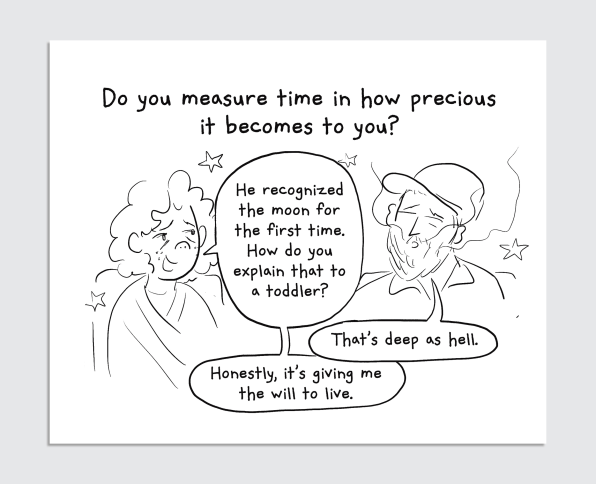
The secret language of cartoons, particularly those that are autobiographical, is that they’re at once universal and highly specific. The best cartoons feel like an inside joke between you, the comic, and thousands of other people. Everyone who has taken care of a child understands what it means to not sleep, to feel overwhelmed, but also like your heart is going to explode with love. Distilling those feelings into a drawing or a series of panels is where the incisive beauty of cartooning emerges. “Panels are such a gift for setting up a joke,” says Whit Taylor, whose illustrated story “A Motherhood Time Warp” is an intensely relatable portrait of early motherhood.
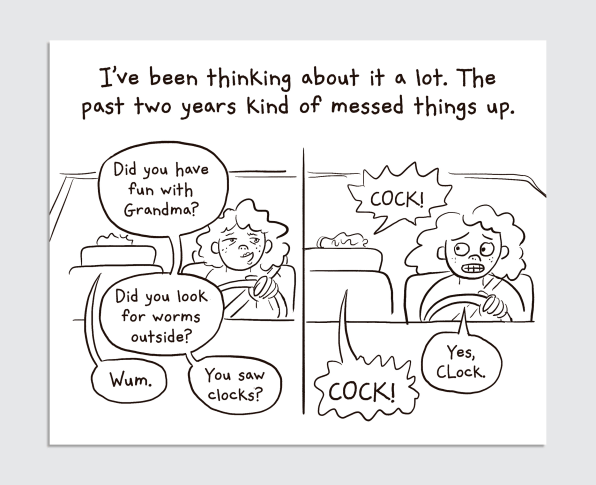
And it’s true. Most of the cartoons that exist within the mom genre are meant to be funny. They are punchy, but also tender. Reading them is like getting a knowing glance from a stranger during a toddler’s public meltdown. This is miserable. It will pass. And you will miss it when it does.
(65)